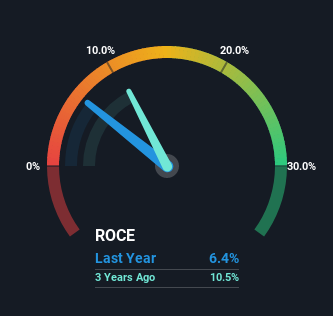- Singapore
- /
- Food and Staples Retail
- /
- SGX:D01
DFI Retail Group Holdings (SGX:D01) May Have Issues Allocating Its Capital
If we want to find a stock that could multiply over the long term, what are the underlying trends we should look for? Firstly, we'd want to identify a growing return on capital employed (ROCE) and then alongside that, an ever-increasing base of capital employed. If you see this, it typically means it's a company with a great business model and plenty of profitable reinvestment opportunities. In light of that, when we looked at DFI Retail Group Holdings (SGX:D01) and its ROCE trend, we weren't exactly thrilled.
Understanding Return On Capital Employed (ROCE)
Just to clarify if you're unsure, ROCE is a metric for evaluating how much pre-tax income (in percentage terms) a company earns on the capital invested in its business. Analysts use this formula to calculate it for DFI Retail Group Holdings:
Return on Capital Employed = Earnings Before Interest and Tax (EBIT) ÷ (Total Assets - Current Liabilities)
0.064 = US$261m ÷ (US$7.6b - US$3.5b) (Based on the trailing twelve months to December 2021).
Thus, DFI Retail Group Holdings has an ROCE of 6.4%. On its own, that's a low figure but it's around the 7.0% average generated by the Consumer Retailing industry.
Check out our latest analysis for DFI Retail Group Holdings

In the above chart we have measured DFI Retail Group Holdings' prior ROCE against its prior performance, but the future is arguably more important. If you'd like to see what analysts are forecasting going forward, you should check out our free report for DFI Retail Group Holdings.
So How Is DFI Retail Group Holdings' ROCE Trending?
In terms of DFI Retail Group Holdings' historical ROCE movements, the trend isn't fantastic. Around five years ago the returns on capital were 19%, but since then they've fallen to 6.4%. And considering revenue has dropped while employing more capital, we'd be cautious. This could mean that the business is losing its competitive advantage or market share, because while more money is being put into ventures, it's actually producing a lower return - "less bang for their buck" per se.
On a side note, DFI Retail Group Holdings' current liabilities are still rather high at 47% of total assets. This can bring about some risks because the company is basically operating with a rather large reliance on its suppliers or other sorts of short-term creditors. Ideally we'd like to see this reduce as that would mean fewer obligations bearing risks.
The Key Takeaway
From the above analysis, we find it rather worrisome that returns on capital and sales for DFI Retail Group Holdings have fallen, meanwhile the business is employing more capital than it was five years ago. It should come as no surprise then that the stock has fallen 57% over the last five years, so it looks like investors are recognizing these changes. That being the case, unless the underlying trends revert to a more positive trajectory, we'd consider looking elsewhere.
DFI Retail Group Holdings does have some risks, we noticed 4 warning signs (and 1 which is concerning) we think you should know about.
If you want to search for solid companies with great earnings, check out this free list of companies with good balance sheets and impressive returns on equity.
New: Manage All Your Stock Portfolios in One Place
We've created the ultimate portfolio companion for stock investors, and it's free.
• Connect an unlimited number of Portfolios and see your total in one currency
• Be alerted to new Warning Signs or Risks via email or mobile
• Track the Fair Value of your stocks
Have feedback on this article? Concerned about the content? Get in touch with us directly. Alternatively, email editorial-team (at) simplywallst.com.
This article by Simply Wall St is general in nature. We provide commentary based on historical data and analyst forecasts only using an unbiased methodology and our articles are not intended to be financial advice. It does not constitute a recommendation to buy or sell any stock, and does not take account of your objectives, or your financial situation. We aim to bring you long-term focused analysis driven by fundamental data. Note that our analysis may not factor in the latest price-sensitive company announcements or qualitative material. Simply Wall St has no position in any stocks mentioned.
About SGX:D01
DFI Retail Group Holdings
Operates as a retailer in Hong Kong, Mainland China, Macau, Taiwan, Singapore, Cambodia, Malaysia, Indonesia, and Brunei.
Good value with reasonable growth potential.
Market Insights
Community Narratives




